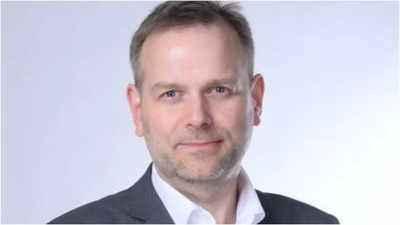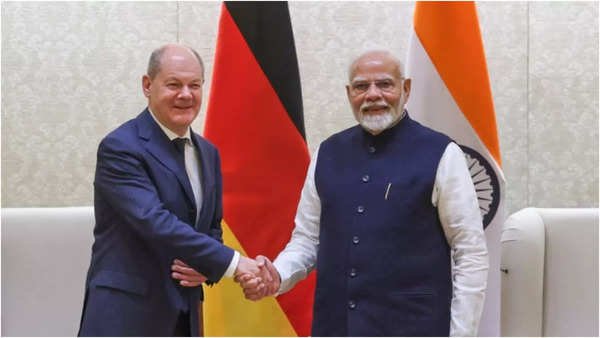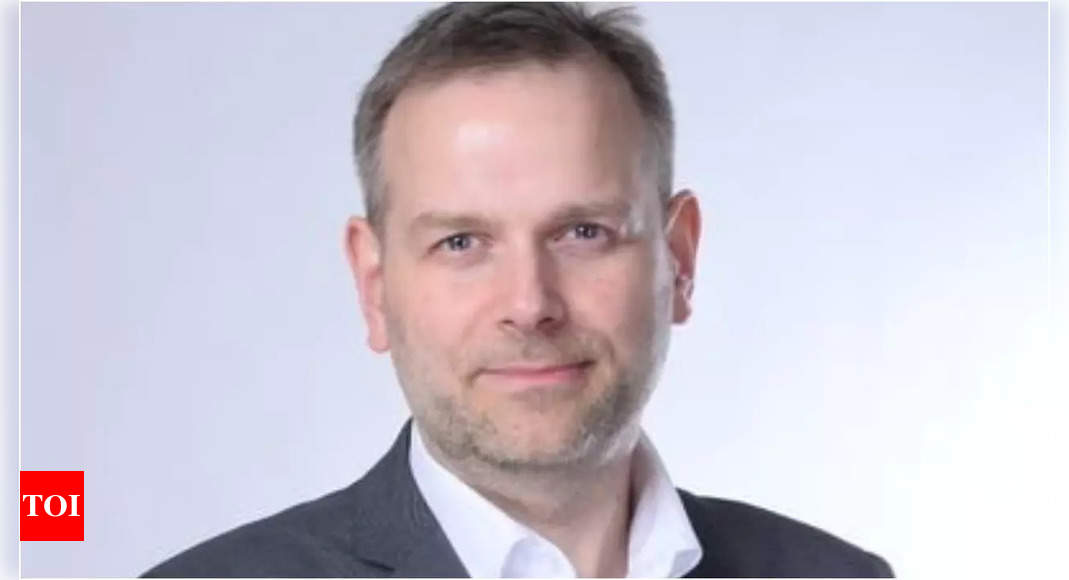
Germany’s most controversial rightwing party, Alternative for Germany (AfD) was invited to accompany Chancellor Scholz’s ongoing visit to India. But Leif-Erik Holm, Opposition Member of the Bundestag and AfD’s economic advisor, had to pull out due to illness. In an exclusive interview to Padma Rao Sundarji from Germany for Times of India Online, Holm talked about why AfD’s popularity is growing so rapidly, Germany’s problem with illegal immigration, its good experience with migrants from India and why his country needs Indians so urgently.
Leif-Erik Holm, your party is described as a “far-right”, “right-wing” and “populist” in the mainstream media around the world, including in India. They say your party opposes the migration of foreigners to Germany, especially of Muslims. Is that a fair description of AfD, or do you want to offer a better one?
Holm: The labels that are attached to my party are just as inaccurate as the claim that the AfD generally rejects the immigration of foreigners. We are a conservative party with a strong liberal orientation. What we reject is unrestricted illegal immigration, which completely overburdens our country, our society and our social systems. On the other hand, anyone who comes to us legally, integrates, provides for themselves and contributes to Germany’s prosperity, is welcome.
Your party was democratically elected to three crucial Länder (state) parliaments in eastern Germany earlier this year. We assume there was no rigging of the vote. Yet, other parties refuse to form coalitions with AfD. In fact, they want the AfD banned. Interestingly, even Germany’s Central Council of Jews spoke against any such ban. Why are you hated so much, both by the German media as well as all mainstream political parties?
Holm: The AfD is a thorn in the side of established parties and the mainstream media, because they fear for their positions and their money pots. They are afraid of losing the power they believed to be secure. And rightly so. Because the citizens are voting for us out of conviction, because they want a different policy that finally puts their concerns at the centre of action. A policy that takes care of the interests of its own citizens first. The AfD does that, and that is precisely why more and more people are voting for us.
In February 2024, there were around 137,000 Indians working in skilled positions in Germany. Chancellor Scholz and a huge delegation are here to attract more Indian IT engineers, nurses and caregivers to migrate to Germany. But many Indians fear racism, specifically at the hands of the AfD, and the neo-Nazi groups who claim to be your supporters and enjoy your support too. Indians have been attacked by such goons. What is your party’s stand on Indian migration to Germany ?
Holm: The AfD does not support neo-Nazi groups and is not supported by such groups. These are simply malicious claims that have no basis whatsoever. Let me make this clear: We are a conservative-liberal party; there is no room for extremists in our organisation. Genuinely skilled workers are very welcome here, whether in the service sector, the IT industry, the nursing sector or elsewhere. Germany has had good experiences with the immigration of skilled labour from India so far. On average, they are well educated (16 per cent specialist level, 37 per cent expert level) and have a low unemployment rate (3.7 per cent). The fear of racism is unfounded and is probably due to the distorted picture painted by some left-leaning media. On the other hand, real skilled workers are put off by the high tax and duty burden in Germany, the bureaucracy, the housing shortage, the deteriorating education system and the growing crime rate as a result of uncontrolled mass migration from the Arab and African regions.

The world’s third largest Muslim population lives in India. Among the talent Germany seeks, are many highly educated Indian Muslims too. But some Indian Muslims are conservative, even wear the hijab. There are no problems in India -it is viewed as their choice. But given the AfD’s reluctance to allow conservative Muslims into your country, how will you tackle this conundrum? Surely a democracy like Germany can’t screen applications by religion?
Holm: The free practice of religion is a fundamental right in Germany and applies to all people. But of course we also have a guiding culture that defines our country. And that is not Muslim. We expect immigrants from other cultures to accept and adapt to our values and not try to impose their culture on us. Of course, Muslims are free to wear a headscarf. But women must not be forced to do so, and such a religious symbol has no place in the civil service either. Nobody is forced to eat pork in our country, but it is also not acceptable for Muslims to demand a ban on pork for all pupils in cafeterias, for example, or that Christian festivals should no longer be celebrated. If you want to live according to the principles of Sharia law, you have to immigrate to a country where it applies. In Germany, the Basic Law applies.
Set aside the liberal media. There are dozens of personal accounts on Youtube by young Indians in Germany. They say they don’t feel culturally accepted, that they often get racial slurs hurled at them, that people -especially in eastern Germany -expect them to speak perfect German -which takes at least a decade to learn, that they get sidelined in favour of white English job-seekers, even for jobs that require English. What do you say to them?
Holm: That the reticence with which some citizens in Germany react to immigrants from other cultures is not automatically meant in a derogatory way. Germany isn’t a classic immigration country like the USA, for example, and so it sometimes takes a little longer for people to warm up to each other. The main problem, however, is that Germans have had bad experiences with uncontrolled mass migration. There are too many illegal immigrants who become criminals and commit the most serious crimes. There are gang rapes, gang crime, drug crime, and the perpetrators are mostly foreigners. This naturally gives rise to prejudices, from which even the righteous immigrants suffer. It was and is a serious mistake on the part of former Chancellor Angela Merkel and now Chancellor Olaf Scholz, to allow this to go on for years. We need to control and regulate immigration. This will also facilitate the integration of those immigrants who abide by the law, who are hard-working and who contribute to society.
As an economist yourself, why do you think Germany, an industrial giant and an economic superpower, is in such bad shape today?
Holm: The German government’s disastrous economic policy has led to Germany being the only leading industrialised nation with no economic growth. We are in recession for the second year in a row. We are the sick man of Europe. Meanwhile, everyone else around us is growing, everyone else is coping better with the same problems such as the consequences of the war in Ukraine, the coronavirus crisis and the global market. This shows that our weakness is home-made. We have far too high a tax and duty burden, a non-functioning energy transition has caused energy prices to explode and made us uncompetitive. Bureaucracy is overburdening companies and citizens, the costs of the social systems are out of control, which is why there is a lack of investment in infrastructure and digitalisation. All of this has led to more and more companies in Germany giving up, or moving abroad, where they find better framework conditions.
It was German Economics Minister Robert Habeck (Green Party) who invited you to come along to India – specifically to attend the to Asia Pacific Conference of German businesses (APK) in New Delhi. You have lampooned Mr Habeck’s economic policies fiercely. Is that the real reason why you stayed home ? Surely Germany’s economic crisis cannot be attributed to Germany’s current coalition government alone?
Holm: We, in AfD, are in favour of the social market economy that has made our country great, while Mr Habeck is a friend of the planned economy. We think that the economy needs freedom. Mr Habeck is in favour of redistribution and would rather put companies on a leash. But no, that doesn’t stop us from getting on a plane together. I would have loved to be there -unfortunately, I fell ill.
You have also criticized the German government’s proposal to lower taxes for foreign migrants. Perhaps this is intended to make migration to Germany even more attractive. So if AfD, too, wants more Indian migrants, why are you slamming this incentive?
Holm: The planned tax rebate for foreign skilled workers is a slap in the face for all hard-working citizens in Germany. We cannot degrade the many Germans who get up early every day and work for far too little net income, to second-class taxpayers. That is absurd. We say that relief is needed, but for everyone.
What do you think Mr Habeck should focus on while here, given Germany’s interest in both Indian migration, but also in selling in products – especially weapons – to India?
Holm: Mr Habeck should make it clear that we are a reliable trading partner whose products stand for the highest quality. And that both Germany and India benefit from close economic relations. Mr Habeck should act accordingly, as a trading partner and not as a teacher. The economy must take centre stage, not green climate ideology.
What are your closing words for thousands of Indians who are still streaming to relatively safe and well-known domains like the United States? How will you encourage them to come to Germany instead ? And should migrating Indians do, to ‘integrate’ successfully into German society?
Holm: Germany is a great country that is unfortunately currently badly governed. We as the AfD want to change this and ensure that Germany becomes attractive and strong again. For German citizens, hundreds of thousands of whom are currently emigrating, and also for real skilled workers from abroad. This means lower duties and taxes, especially on energy, more investment in infrastructure and digitalisation and a consistent reduction in bureaucracy. We want to make Germany fit again as a business location. And anyone who wants to lend a hand is welcome.
